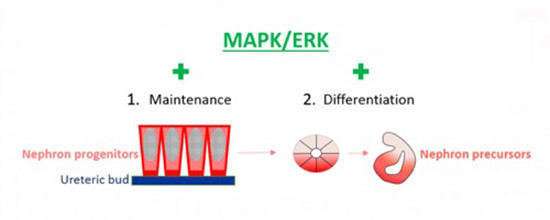Signaling pathway frequently altered in cancer controls normal kidney development

The prevalence of kidney diseases is growing rapidly due to an aging population and an increased incidence of diseases like diabetes. Moreover, congenital anomalies of the kidney are among the most frequently occurring birth defects and play crucial causative roles in the development of renal diseases.
Currently, the only treatments for these diseases are dialysis and transplantation, which are insufficient and expensive with a higher mortality rate than most cancers.
Development of new diagnostic and therapeutic modalities for renal diseases requires detailed knowledge of the mechanisms regulating kidney development. Significant advances were made in recent research at the University of Helsinki. Researchers studied the MAPK pathway, aberrations of which are linked to many types of cancers, and it was identified as a key regulator of the final nephron number in a mature kidney.
The MAPK pathway mediates extracellular growth factor stimuli to the cell interior. It has functions in both the cell nucleus, where it controls DNA by binding to target regions, and in the cytosol, where it regulates activities of many different proteins. The study, now published in Stem Cell Reports , shows that MAPK activity is not only required for the normal proliferation and differentiation of nephron progenitors, but also mediates crucial nephron progenitor interactions with the surrounding environment.
"Our results reveal that MAPK activity participates in modulating cellular adhesion, which is constantly required in developing systems to enable cellular motility and morphogenesis," says principal investigator Satu Kuure from the University of Helsinki, Finland.
MAPK activity modulators have long been actively in use for treating cancer patients. This, together with the new results, gives hope for the development of stem cell-based regenerative therapies as novel treatments for patients suffering from renal diseases.
"Use of MAPK modulators allows efficient and precise activation as well as inactivation of the pathway. Timely utilization of this in patient-derived organoid differentiation may significantly improve the outcome," says Kuure.
More information: Anneliis Ihermann-Hella et al, Dynamic MAPK/ERK Activity Sustains Nephron Progenitors through Niche Regulation and Primes Precursors for Differentiation, Stem Cell Reports (2018). DOI: 10.1016/j.stemcr.2018.08.012
















